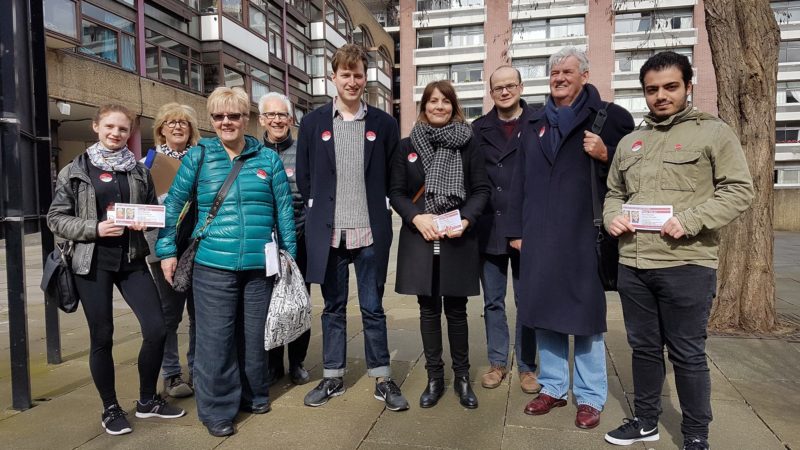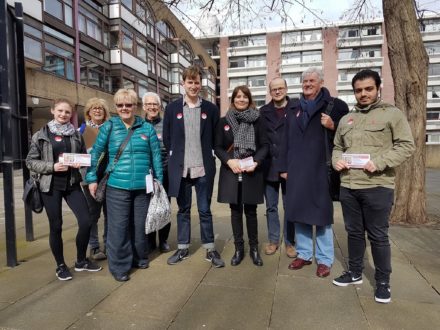

With local elections rolling out across the country in 2018, it might reasonably have slipped your attention that the City of London will be heading to the ballot box this week. And whilst opinion polls nationwide making Labour supporters nervous, the party could be on the cusp of an historic victory in the City.
An unopposed seat has already been claimed in Aldersgate, and a number of candidates look well placed to take seats on the Indepenent held council. William Campbell-Taylor became the first Labour councillor in the City of London in 2014, and the local organisers are hoping to build on that unprecedented success. When I spoke to Mary Durcan, a candidate in Cripplegate, she said that in the many years she had lived in the area she had never seen a local campaign with such energy. Every weekend, members have turned out to knock on all the doors door in the ward and leaflet every house – often the number of activists stretches into double figures, which would be an impressive tally for any local election, let alone in an area where Labour’s presence has traditionally been so marginal.
Part of this new enthusiasm can be linked to the team that are working in the City. The party has filled its slate this year with candidates who could break new ground in the City. Munsur Ali, if elected in the Portsoken ward, would be the first ever Bengali Labour councillor there, whilst, at 24, William Pimlott, a candidate in Cripplegate, would be one of the youngest. William and Mary would be the first Labour councillors in Cripplegate, whilst Munsur, along with Jason Pritchard, could double Labour’s representation in Portsoken. The local Labour party’s ambition and reach has grown, and that’s to the great benefit of the locals. In an area famous for creaking, stuffy institutions, it is of paramount importance that the Labour party continues to provide residents with diverse and exciting candidates.
After all, the City isn’t just home to bankers, accountants, insurance moguls and their retinues. It has some of the most historic and innovative housing projects in the city. From the social housing of the Golden Lane estate to the architectural innovation of the Barbican, the City bloomed in the post-war era. But that legacy is being let down – as it is in so many places – by the government’s failure to address the modern reality of the housing crisis. The City of London has avoided spending millions of pounds that were ring-fenced for this purpose, and maintenance of the Golden Lane estate leaves an enormous amount to be desired. Put simply, the situation in the City of London has slipped under the radar but is in desperate need of attention.
On the doorstep, residents are, of course, unconvinced about the council’s ability to make significant improvements to their life. It’s hard to blame them after so much neglect and disengagement over the years. But in the period since Labour took its first seat on the council, real progress has been made: the local campaign for a living wage was influential in the decision to implement it from 2014.
This is the message we are trying to communicate to people in the City. Breaking past the immediate wall of resistance from people who haven’t been canvassed in years can be tricky, but it’s a necessary challenge. The fiasco with maintenance of the Golden Lane estate has been caused by a lack of oversight and accountability on the part of their elected officials, and, with new development projects scheduled for Bernard Morgan House and the Richard Cloudesley estate, these issues are only going to grow. The Labour party needs to stand up for residents in an area that has had an indifferent relation with political representation.
The City of London is an unlikely microcosm for the whole of the United Kingdom, but we can all draw some hope from the success that the party is having. Hardworking candidates supported by a committed team on the ground will always be one of the Labour party’s great strengths. After the 2015 General Election, there was a tendency to talk down the importance of local activists, but game-changing gains in the City of London, especially against the tide of national discourse, could provide a playbook for reenergising branch campaigns ahead of the local elections next year.
Nick Hilton is a journalist and filmmaker and member of Cities of London and Westminster CLP.
If you’re able to help out on the campaign you can visit the website here to find details of how to help or follow the branch on twitter.




More from LabourList
Turning the page? Labour’s recovery in the polls show a path to 2029 victory
Restoration announce recommendations for NEC candidates
‘Factionalism at the top is weakening Labour – and handing a gift to Reform’